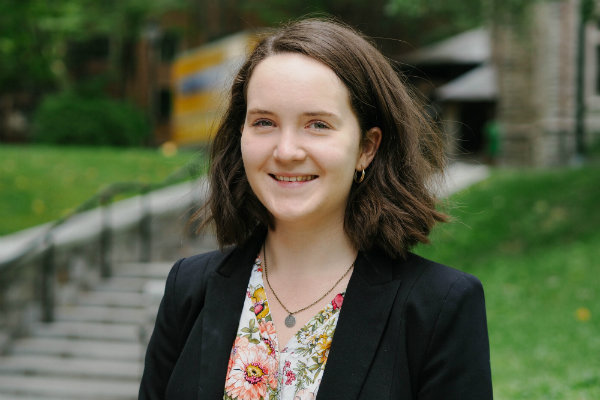On the Condition of Alienage
Eilidh Beaton, doctoral candidate in philosophy, argues for the reconsideration of the alienage condition for refugee status.
People in fear for their lives flee their home countries every day. Some traverse multiple borders over harsh terrain with the threat of physical and sexual violence. Others try to cross the Mediterranean Sea aided by smugglers in small, unsafe boats. There are many stories; however, these journeys are almost uniformly treacherous.
What if these individuals could apply for refugee status from within their home countries, avoiding dangerous journeys and free from the reliance on human traffickers or smugglers?
In an upcoming issue of the international journal, Law and Philosophy, Eilidh Beaton, a fifth-year doctoral candidate in philosophy who spent summers volunteering for Oxfam Great Britain, makes the philosophical argument that this should be the reality.
International law currently stipulates that a refugee must meet an “alienage condition,” which states that refugee status can only be granted to someone who is physically outside of their home country. In addition to meeting the alienage condition, refugees must meet the persecution condition, which states that an individual must show a “well-founded fear of being persecuted for reasons of race, religion, nationality, membership of a particular social group, or political opinion.”
Much of the philosophical literature on refugees has centered around the persecution condition, says Beaton, while it’s taken for granted that the alienage condition should remain. Beaton wants to shatter that supposition.
“Most people, even people that argue for very radical progressive views about how we should discuss the persecution condition, generally assume that the alienage condition should be upheld,” says Beaton, whose research focuses on political philosophy and global justice. “I argue that that presupposition is flawed and that people who are facing serious harm and who remain in their home countries and have no recourse to their own governments should also be entitled to refugee status.”
The alienage condition places the burden on the persecuted person to exit their home country, says Beaton, which is problematic because it means that people often have to take very dangerous journeys to exit. “They shouldn't have to leave their country for the international community to have obligations to them and their safety,” Beaton states.
As a philosopher, Beaton is not making an immediate policy proposal through her paper “Against the Alienage Condition for Refugeehood,” but instead is asking readers to consider what refugee policies might look like in a better world. If the alienage condition was removed, the international community could consider actions and policies that support the safe exit of those who feel endangered including, but not limited to, issuing humanitarian visas, putting pressure on home countries, or supporting extended family reunification applications.
“It’s not feasible to remove the alienage condition from international law tomorrow and a lot of complicated questions arise about how to do it in a permissible way,” Beaton explains. “However, my goal is to push people to reconsider the condition and think about an alternative policy that states could adopt for safety. Even if they're not immediately implementable as policy proposals, they are goals that can be worked towards gradually and over time.”
Beaton’s dissertation, “The Right to Refuge and What Happens Next,” expands upon the considerations raised in her upcoming paper. The first half considers the definition of a refugee in international law and argues for various ways the definition should be expanded. The second half discusses what should happen once a person arrives as a refugee in another country and what kind of rights they should be entitled to.
For Beaton, it’s important that philosophical work is informed by relevant empirical and policy research, which is why she spent a full year and a summer working with Oxfam, first in Glasgow, Scotland and then in Oxford, England. In Oxford, she worked on Oxfam’s campaign for refugee family reunification. Many of the questions with which Beaton grapples in her dissertation were informed by her on-the-ground work there.
Beaton is completing her dissertation under the supervision of Kok-Chor Tan, Professor of Philosophy, a leading thinker in political philosophy, global justice, and human rights. She’s also aided by Brian Berkey, Professor of Legal Studies and Business Ethics at Wharton, and Samuel Freeman, Avalon Professor in the Humanities and Professor of Philosophy and Law.
“I have the best committee a Ph.D. student could ask for," says Beaton. "My advisor, Professor Tan, is an expert in his field and he's so supportive. Whenever I talk with him about a new thought I have for my dissertation, he immediately has five to ten reading recommendations that are all incredibly relevant and helpful."
In the future, Beaton plans to remain connected to the work being done on behalf of refugees by organizations and policy advocates around the world. “In order to do responsible research in philosophy, I think it’s really important to be aware of what’s happening beyond philosophy in international law, international policy discussions, and in non-profit advocacy,” she says. “Most importantly, it’s critical to listen to the testimony of refugees and immigrants.”



